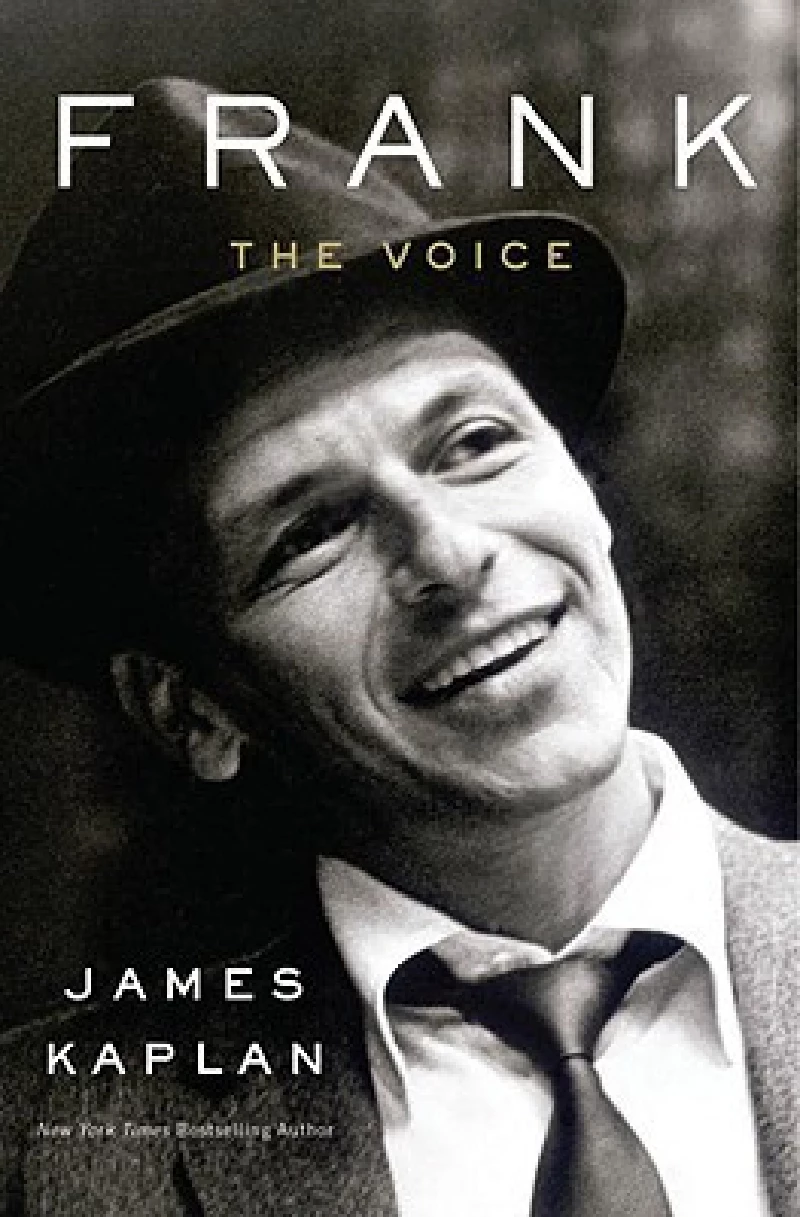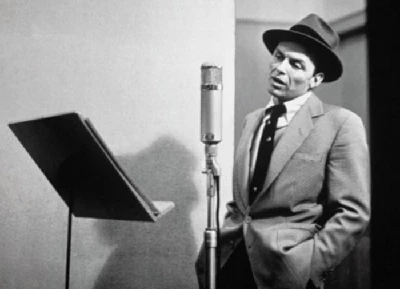Frank Sinatra - The Voice
by Lisa Torem
published: 26 / 5 / 2023

intro
In her ‘Raging Pages’ book column Lisa Torem examines James Kaplan’s book ‘Frank: The Voice’, which explores the first forty years of Frank Sinatra’s complicated life
Author James Kaplan co-wrote ‘Dean and Me’ about Dean Martin with entertainer Jerry Lewis prior to taking on the herculean task of chronicling the first forty years of Sinatra’s existence in ‘Frank: The Voice’. Its title inspired by his debut LP ‘The Voice of Frank Sinatra’. Kaplan, as Frankophile, apparently didn’t get his fill; he followed this bio up with ‘Sinatra: The Chairman’ in 2015. Yet although published several years earlier, ‘Frank: The Voice,’ is a solid and captivating read. Kaplan’s novelistic style feels as contemporary as any other pop music biography currently on the shelf. Interestingly, Kaplan introduces us to the newborn Francis Albert, by way of a tragic scenario, in which his nineteen-year-old mother, Dolly endures a hellish labor. The local doctor yanks the newborn out into the world with a pair of forceps, scarring the left side of the future singer’s face. Kaplan lays it on the line: “Sinatra bore the scars of his birth, both physical and psychological, to the end of his years”. At 12, he gathered a crowd at his father’s saloon. At 21, he became a member of the Hoboken Four. Through Dolly’s aggressive actions however, he became the star. Kaplan cleverly juxtaposes Dolly’s tactics with Frank’s genuine interest in the art of expression. His mother often used political pull to move her son’s career along more quickly; meanwhile Frank worried more about the pure creativity of vocal storytelling. He admired Bing Crosby’s casual stage demeanor and silky voice and hoped to emulate the Irish-American singer’s success. But at the same time, Frank remained acutely aware of his own strengths and talents; he cultivated a suave baritone range and developed a swoon-worthy street appeal that contrasted deeply with Crosby’s clean-cut persona. Professionally, Frank often emerges as a fighter. For example, while many singers of his era were content to perform as centerpiece of a big band, Frank found himself restless. Orchestra leader Tommy Dorsey provided a certain degree of economic security, and at times became a much-desired father figure. The relationship was often fraught with tension however and Frank fought for the chance to go solo. But how? Just a singer with a piano? Or a small combo? It was a risky dream… Starry-eyed youth, known as bobby soxers meanwhile, screamed at the sight of the rail-thin singer. Years before Elvis Presley and The Beatles encountered similar treatment, Frank stamped his fate as one of American’s first teen idols. Kaplan also explores Frank’s roving eye and dismissive attitude toward his first wife, Nancy. She dutifully raises their three children, keeps house, makes delicious meals and hangs on to the hope that her husband will take his home life as seriously as life on the road. Enter the glamorous Ava Gardner for whom Frank falls hard. Tempers flare. She’s not content to be “the other woman.” Meanwhile, Nancy is reluctant to grant her husband a divorce for religious reasons. Gardner’s career rockets; Frank’s nearly hits rock bottom. Gossip columnists rejoice. The hot-tempered couple make great copy. Frank’s own star continues to fade until he gets an important role in a Hollywood film based on a novel. Kaplan brings these moments into scene with impressive skill, nuance and candour. The subject matter was tough. Frank Sinatra was a complicated man in many ways. He befriended black artist friends and fought for the civil liberties of the underserved, but he was also known as a bully. We see clear examples of both. And when the drama subsides, we see Frank Sinatra, the consummate performer. He hears a touching song on the radio and immediately tracks down the songwriter. He labours over the efficiency of every lyric, goes mad over an avalanche of strings, when a simple set of piano chords will do just fine, and refuses to compromise when it comes to selecting an orchestral arranger. As I read the book, I looked up the songs simultaneously and marvelled at Kaplan’s astute analyses. I found out much about golden musical eras and grew to admire Frank Sinatra’s unarguable drive. I believe you will, too.
Also In Raging Pages
Alice Cooper (2015)
Beatles (2022)
Benjamin Orr (2018)
Bernard Purdie (2015)
Billy Bragg (2017)
Billy J. Kramer (2016)
Bob Boilen (2016)
Bob Dylan (2018)
Bob Marley (2019)
Brian Wilson (2017)
Byrds (2024)
Cher (2025)
Clive Davis (2015)
Common (2020)
Damned (2021)
Don Short (2020)
Donovan (2022)
Elliott Murphy (2019)
Elvis Costello (2015)
Felix Cavaliere (2022)
Flip Side (2025)
Frank Zappa (2017)
Gary Wright (2014)
Gene Simmons (2015)
Geoff Emerick (2018)
George Harrison (2022)
George Martin (2019)
Green Day (2019)
Holger Czukay (2025)
Ian Mclagan (2016)
Iron Maiden (2014)
Jann Wenner (2019)
Jerry Lee Lewis (2015)
Jerry Nolan (2018)
Jim Summaria and Mark Plotnick (2019)
Jimmy Webb (2022)
Joe Perry (Aerosmith) (2014)
John Lennon (2017)
Kinks (2014)
Lani Hall Alpert (2019)
Laurence Juber (2014)
Liberty DeVitto (2021)
Lisa Robinson (2021)
Lita Ford (2021)
Little Anthony (2014)
Louise Harrison (2015)
Luke Haines (2024)
Manic Street Preachers (2017)
Mary Wilson (2021)
Michael Bloomfield (2020)
Michael Dorf (2019)
Miscellaneous (2014)
Ozzy Osbourne (2014)
Pamela Des Barres (2017)
Peter Doherty (2014)
Radiohead (2022)
Renee Rosen (2018)
Richard Balls (2018)
Rick Wakeman (2023)
Ringo Starr (2015)
Robby Krieger Band (2022)
Roger Daltrey (2020)
Rolling Stones (2016)
Ronnie Wood (2015)
Roy Bond (2023)
Sam Phillips (2018)
Sean Madigan Hoen (2014)
Silas House (2020)
Spencer Vignes (2017)
Spirit (2023)
Suzi Quatro (2023)
Sylvain Sylvain (2018)
Thin Lizzy (2016)
Tommy James (2021)
Tommy Mottola (2025)
Tori Amos (2020)
U2 (2021)
Who (2014)
Will Romano (2015)
Woody Woodmansey (2018)
Zz Top (2014)
Band Links:-
https://en.wikipedia.org/wiki/Frank_SinatraPlay in YouTube:-
profiles |
|
Frank Sinatra in the Fifties (2010) |

|
| Jon Rogers reflects upon the musical career and comeback of Frank Sinatra in the Fifties |
most viewed articles
current edition
Shrag - Huw Stephens Session 08.12.10 and Marc Riley Session 21.03.12Gary Numan - Berserker
Razorlight - Photoscapes
John Hassall - Photoscapes
Max Bianco and the BlueHearts - Troubadour, London, 29/3/2025
Primal Scream - Photoscapes
Roberta Flack - 1937 - 2025
Waeve - Club Academy, Manchester, 18/3/2025
previous editions
Heavenly - P.U.N.K. Girl EPManic Street Preachers - (Gig of a Lifetime) Millennium Stadium, Cardiff, December 1999
Boomtown Rats - Ten Songs That Made Me Love....
Beautiful South - Ten Songs That Made Me Love...
Barrie Barlow - Interview
Oasis - Oasis, Earl's Court, London, 1995
Trudie Myerscough-Harris - Interview
Dwina Gibb - Interview
Pixies - Ten Songs That Made Me Love...
Doris Brendel - Interview
most viewed reviews
Pennyblackmusic Regular Contributors
Adrian Janes
Amanda J. Window
Andrew Twambley
Anthony Dhanendran
Benjamin Howarth
Cila Warncke
Daniel Cressey
Darren Aston
Dastardly
Dave Goodwin
Denzil Watson
Dominic B. Simpson
Eoghan Lyng
Fiona Hutchings
Harry Sherriff
Helen Tipping
Jamie Rowland
John Clarkson
Julie Cruickshank
Kimberly Bright
Lisa Torem
Maarten Schiethart